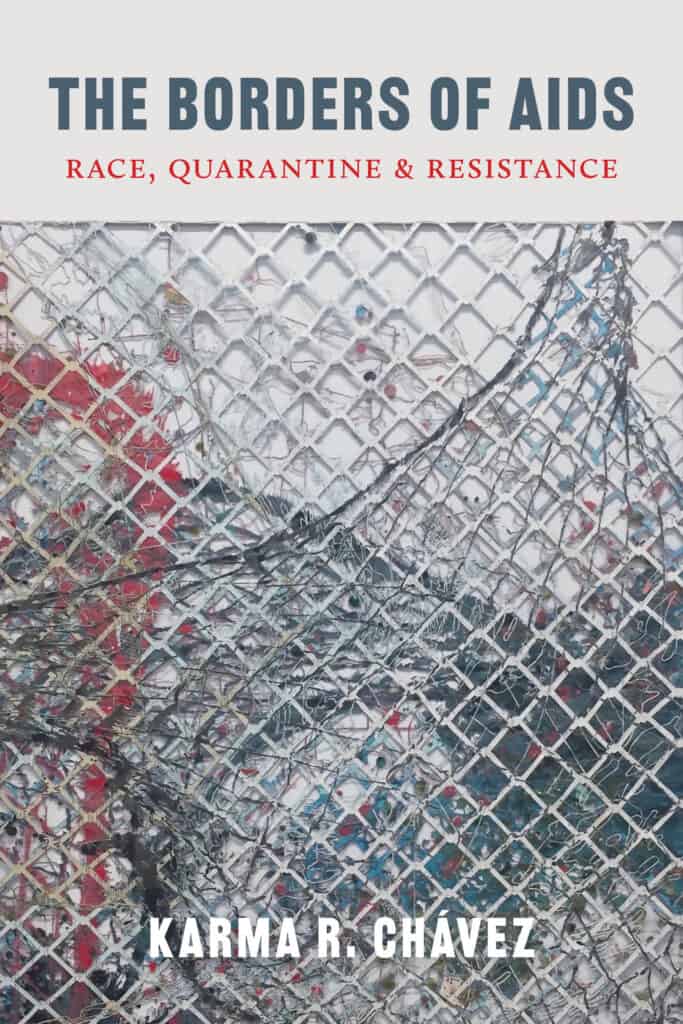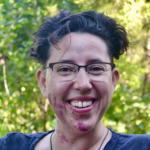Karma R. Chávez
As soon as US media and politicians became aware of AIDS in the early 1980s, fingers were pointed not only at the gay community but also at other countries and migrant communities, particularly Haitians, as responsible for spreading the virus. Evangelical leaders, public health officials, and the Reagan administration quickly capitalized on widespread fear of the new disease to call for quarantines, immigration bans, and deportations, scapegoating and blaming HIV-positive migrants—even as the rest of the world regarded the US as the primary exporter of the virus. In The Borders of AIDS, Karma Chávez demonstrates how such calls proliferated and how failure to impose a quarantine for HIV-positive citizens morphed into the successful enactment of a complete ban on the regularization of HIV-positive migrants—which lasted more than twenty years. News reports, congressional records, and AIDS activist archives reveal how queer groups and migrant communities built fragile coalitions to fight against the alienation of themselves and others, asserting their capacity for resistance and resiliency. Building on existing histories of HIV/AIDS, public health, citizenship, and immigration, Chávez establishes how politicians and public health officials treated different communities with HIV/AIDS and highlights the work these communities did to resist alienation.

NOTCHES: In a few sentences, what is your book about? Why will people want to read your book?
KC: Broadly speaking, my book is about how the US nation-state uses disease as an opportunity to enact what I call “alienizing logic.” The US is of course founded upon assigning numerous groups to an alien status, and HIV/AIDS became yet another rationale for powerful people to enact alienizing logic, this time through quarantine proposals domestically, and a ban on HIV-positive immigrants. My book shows how quarantine came to be seen as a reasonable response to HIV/AIDS, how that same logic led to the ban, and finally, how people living with AIDS and their allies agitated and resisted. I think people will want to read this book because it tells a story about AIDS that puts immigration and citizenship at the center, and I think that focus resonates with the contemporary moment as we continue to live through COVID-19.
NOTCHES: What drew you to this topic, and what questions do you still have?
KC: I am in interested in how and why people build coalitions with others and what those fragile relationships look like and achieve. As I was finishing my first book, Queer Migration Politics, I was invited to write a short piece for a journal for the 25th anniversary of the founding of ACT UP New York. It was in a big journal, so I said yes, but I had no ideas. I found a tiny story about Haitians’ involvement in ACT UP New York which I found so interesting given I’d only ever heard about how racist ACT UP New York was, and that became the seed of the book. The activism sections of the book really center on ACT UP, and I am still interested in learning more about other AIDS workers, particularly people of color, who were also addressing immigration issues in the late 80s and early 90s.
NOTCHES: How did you research the book?
KC: I should say from the beginning that I’m not a historian, and I was never properly trained in archival research. However, I was initially interested in the question of how AIDS activists addressed immigration issues. So, I began with that in mind and looked at all the AIDS activist archives I could find in North America. It is not surprising that the collections of ACT UP New York and two ACT UP activists from the San Francisco Bay Area formed the basis of my research because ACT UP activists kept incredible archives. In those collections, I found a trove of ephemera as well as meeting minutes, planning documents, press packets, speeches, and photos. From there, I spent a lot of time in online media databases, for mainstream media, gay media, and ethnic media sources. The truth is my research process is more haphazard than it should be!
NOTCHES: Whose stories or what topics were left out of your book and why? What would you include had you been able to?
KC: Originally, I wanted this to be a book about how AIDS activists addressed immigration issues, and I’d planned to think of activism quite expansively. I had wanted to write a chapter on those who worked on providing AIDS education to migrant farm workers in the late 1980s and 1990s in places like Florida and California. A lot of people don’t realize that in the US, farm workers were disproportionately infected with HIV in the early days and literally no one was talking to them. A group of physicians, academics, and non-profit workers began to realize this and wanted to help, but there was no money and no materials. So, they had to find ways to petition the government to recognize this group as worth providing funding for, and then they had to work with all the urban-centered education materials in order to create something that would be culturally appropriate for farm workers. I talked to a few folks who were on the ground doing this amazing work, and I eventually came to believe that that chapter was a bit of a square peg in a round hole and decided to leave it for a later article.
NOTCHES: Did the book shift significantly from the time you first conceptualized it?
KC: Radically! As I said before, it was only meant to be a book on AIDS activism, but one of the things that happened was as I was trying to figure out how to fill the pages of that project, I kept seeing quarantine come up. This made no sense because of course HIV/AIDS is not casually communicable, yet in the US context, I began to realize how much the idea of quarantine proliferated in the public sphere in the early 1980s. And then I started to see that some of those really advocating for quarantine were the same ones who advocated for the ban on HIV positive immigrants, so the lens really shifted to a story about how we got to that ban, and then how people resisted it.
NOTCHES: How did you become interested in the history of sexuality?
KC: I was a religious studies major in college, and as a half-closeted lesbian, I wanted to really know what the Christian bible had to say about homosexuality. I grew up in a very conservative part of the rural US (Nebraska), and so I was surrounded by people who were devout Christians and equally devout homophobes. So, I read everything there was to read about the handful of passages in the bible that mention homosexuality and became quite good at debating anti-gay, evangelical Christians. This was in the 1990s, and it was also at the time when a number of protestant ministers were protesting their churches by performing same-sex marriages. One of those ministers, Jimmy Creech, happened to be in Nebraska and when the church put him on trial to determine whether to de-frock him, the trial took place just north of where I was in school. So, a whole bunch of activists from around the country descended upon rural Nebraska. At the protest surrounding Creech’s trial, I was trained in the satyagraha method of civil disobedience by Mel White, the founder of Soulforce, which was one of the first gay Christian activist organizations. I wrote my first master’s thesis on the rhetoric of the gay Christian movement, and I’ve been studying sexuality in some form ever since.
NOTCHES: How do you see your book being most effectively used in the classroom? What would you assign it with?
KC: I am trained in the field of rhetoric as a rhetorical critic, and so I do imagine one of the primary uses of this book to be somewhat methodological. In other words, I think the book is a good example of how to analyze texts rhetorically, which means, how to analyze texts for the argumentative and persuasive work they’re doing in the public sphere. In terms of content, I hope the book contributes to queer of color critique, women of color feminism, AIDS history, studies of social movements, and queer migration studies. I would love to see the book in 20th century queer history courses; queer social movement courses; courses on pandemics and disease; and courses on immigration, borders, and the nation-state. I think teaching the book alongside works like Jennifer Brier’s Infectious Ideas, Sarah Schulman’s Let the Record Show, and Cathy J. Cohen’s The Boundaries of Blackness would be amazing in a queer history course. But I’d also love to see the book taught alongside Naomi Paik’s Rightlessness, Neel Ahuja’s Bioinsecurities, and Eric Stanley’s Atmospheres of Violence in a course about the nation-state and belonging. So many possibilities!
NOTCHES: Why does this history matter today?
KC: I certainly didn’t mean to publish a book about a pandemic during another pandemic, but I don’t think there’s any better time to be thinking about how nation-states use disease as an opportunity to treat people really badly than right now. I won’t make a lot of parallels to COVID-19, but I will say that histories of how governments responded to AIDS and how AIDS activists responded to governments have many lessons for us in the contemporary moment. I hope my book highlights some of those.
NOTCHES: Your book is published, what next?
KC: Resting, reading, and thinking: three things academics don’t often have or take time for.
 Karma R. Chávez teaches, writes, and currently serves as chair in the Department of Mexican American and Latina/o Studies at the University of Texas at Austin. She has published four co-edited volumes; a book of interviews called Palestine on the Air (U of Illinois Press, 2019); and monographs entitled Queer Migration Politics: Activist Rhetoric and Coalitional Possibilities (U of Illinois Press, 2013) and The Borders of AIDS: Race, Quarantine, and Resistance (U of Washington Press, 2021). She is a member of the radical queer collective, Against Equality, and for years she was a member of the organizing collective for LGBT Books to Prisoners in Madison, Wisconsin.
Karma R. Chávez teaches, writes, and currently serves as chair in the Department of Mexican American and Latina/o Studies at the University of Texas at Austin. She has published four co-edited volumes; a book of interviews called Palestine on the Air (U of Illinois Press, 2019); and monographs entitled Queer Migration Politics: Activist Rhetoric and Coalitional Possibilities (U of Illinois Press, 2013) and The Borders of AIDS: Race, Quarantine, and Resistance (U of Washington Press, 2021). She is a member of the radical queer collective, Against Equality, and for years she was a member of the organizing collective for LGBT Books to Prisoners in Madison, Wisconsin.

NOTCHES: (re)marks on the history of sexuality is licensed under a Creative Commons Attribution-NonCommercial-NoDerivatives 4.0 International License.
Based on a work at www.notchesblog.com.
For permission to publish any NOTCHES post in whole or in part please contact the editors at NotchesBlog@gmail.com




